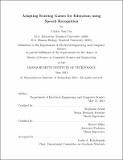| dc.contributor.advisor | Stephanie Sene and Robert Miller. | en_US |
| dc.contributor.author | Cai, Carrie Jun | en_US |
| dc.contributor.other | Massachusetts Institute of Technology. Department of Electrical Engineering and Computer Science. | en_US |
| dc.date.accessioned | 2013-11-18T17:37:05Z | |
| dc.date.available | 2013-11-18T17:37:05Z | |
| dc.date.copyright | 2013 | en_US |
| dc.date.issued | 2013 | en_US |
| dc.identifier.uri | http://hdl.handle.net/1721.1/82184 | |
| dc.description | Thesis (S.M.)--Massachusetts Institute of Technology, Dept. of Electrical Engineering and Computer Science, 2013. | en_US |
| dc.description | This electronic version was submitted by the student author. The certified thesis is available in the Institute Archives and Special Collections. | en_US |
| dc.description | Cataloged from PDF student-submitted version of thesis. | en_US |
| dc.description | Includes bibliographical references (p. 73-77). | en_US |
| dc.description.abstract | Although memory exercises and arcade-style games are alike in their repetitive nature, memorization tasks like vocabulary drills tend to be mundane and tedious while arcade-style games are popular, intense and broadly addictive. The repetitive structure of arcade games suggests an opportunity to modify these well-known games for the purpose of learning. Arcade-style games like Tetris and Pac-man are often difficult to adapt for educational purposes because their fast-paced intensity and keystroke-heavy nature leave little room for simultaneous practice of other skills. Incorporating spoken language technology could make it possible for users to learn as they play, keeping up with game speed through multimodal interaction. Two challenges exist in this research: first, it is unclear which learning strategy would be most eective when incorporated into an already fast-paced, mentally demanding game. Secondly, it remains difficult to augment fast-paced games with speech interaction because the frustrating effect of recognition errors highly compromises entertainment. In this work, we designed and implemented Tetrilingo, a modified version of Tetris with speech recognition to help students practice and remember word-picture mappings. With our speech recognition prototype, we investigated the extent to which various forms of memory practice impact learning and engagement, and found that free-recall retrieval practice was less enjoyable to slower learners despite producing signicant learning benefits over alternative learning strategies. Using utterances collected from learners interacting with Tetrilingo, we also evaluated several techniques to increase speech recognition accuracy in fast-paced games by leveraging game context. Results show that, because false negative recognition errors are self-perpetuating and more prevalent than false positives, relaxing the constraints of the speech recognizer towards greater leniency may enhance overall recognition performance. | en_US |
| dc.description.statementofresponsibility | by Carrie Jun Cai. | en_US |
| dc.format.extent | 77 p. | en_US |
| dc.language.iso | eng | en_US |
| dc.publisher | Massachusetts Institute of Technology | en_US |
| dc.rights | M.I.T. theses are protected by
copyright. They may be viewed from this source for any purpose, but
reproduction or distribution in any format is prohibited without written
permission. See provided URL for inquiries about permission. | en_US |
| dc.rights.uri | http://dspace.mit.edu/handle/1721.1/7582 | en_US |
| dc.subject | Electrical Engineering and Computer Science. | en_US |
| dc.title | Adapting existing games for education using speech recognition | en_US |
| dc.type | Thesis | en_US |
| dc.description.degree | S.M. | en_US |
| dc.contributor.department | Massachusetts Institute of Technology. Department of Electrical Engineering and Computer Science | |
| dc.identifier.oclc | 862074512 | en_US |
